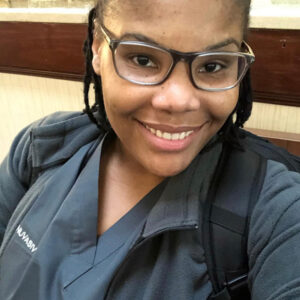‘Every Day Is Another Chance to Change a Patient’s Life’
By Shannon Sigafoos
An infant with a tethered spinal cord. A motor vehicle accident victim who is unable to feel their arms or legs. A woman who is undergoing a cervical fusion.

Shariyah Gordon ’13
No two workdays are alike for Shariyah Gordon ’13, an associate neurophysiologist whose duties include testing and monitoring patients’ nervous systems during surgery to assist surgical teams in avoiding complications such as paralysis or stroke.
Supported by her degree in psychology and experience as a neurodiagnostic technologist, Gordon is in different operating theatres every day as a representative of NuVasive, a spine technology company that helps change the lives of more than 500,000 patients each year. She also serves as the company’s learning and development leader—a part-time role she took on several months ago as she balances the daily challenges of continuously working alongside different care teams.
“It’s one of those things you take day by day, and every case is a different case. You don’t know what you’re going to get when you show up to work,” says Gordon, who knew as early as eighth grade that she was going to go into the medical field. “The idea is to provide the surgeon with the best outcomes so that he or she doesn’t do more damage, and to offer the patient some form of recovery following the surgery. Every day is another chance to change a patient’s life.”
Still, there are days, Gordon says, when she “can’t believe this is my career, and my responsibility.”
During her time at Lafayette, the number of neuroscience concentrators weren’t what they are now, and Gordon was grateful to work with a number of mentors she credits with helping her continue toward her career path (including Luis Schettino, associate professor of psychology and neuroscience; Lisa Gabel, chair of the neuroscience program; and Robert Allan, professor of psychology, emeritus). Like students before and after her, she struggled with the rigorous coursework during her first year and learned that starting at the bottom means there was nowhere to go but up.
“Gradually, over time, things got better. It goes to show that even if you fail or fall, you pick yourself up. You can do this. It’s attainable.”
A first-generation student branches out
Gordon, a New Jersey native, didn’t travel far to attend college but quickly felt culture shock setting in as she realized that there were very few Black females—not to mention Black female STEM majors—on the Lafayette campus at the time. As a student of color who wasn’t an athlete and wasn’t attending school with the support of a scholarship, she struggled to identify areas of support and didn’t necessarily see herself in her peers.
“That was tough in and of itself, because it started to feel like a campus that didn’t necessarily know how to deal with my personal needs,” she says. “I was a first-generation Black student who didn’t fall into one of the existing subsets of students of color who attended Lafayette at the time.”
As she has discovered throughout her life, however, those who want to move the needle have a responsibility to plant the seeds of activism and to start and share important conversations.
Throughout her Lafayette career, Gordon went on to join the Association of Black Collegians, Intercultural Development’s Kaleidoscope (social justice peer educators) program, the Lafayette Society for Neuroscience, Psychology Club, and several LGBTQ+ groups. Branching out not only inspired her to get involved and stay involved, but she carried those lessons when she was recently invited by NIA: Women of Purpose, to speak on a panel about postgraduate decisions.
“A lot of students’ questions revolved around confidence, and one of my missions—when I look outside of what I do on a day-to-day basis—revolves around being a leader. I know what it felt like to not be confident and feel like you’re not good enough. So, we talked about what being a leader looks like. You have to show up and ask the tough questions, and not be afraid to do so.”
The art of listening
Following her graduation from Lafayette, Gordon went on to attend the American Institute of Medical Sciences & Education (AIMS), where she became certified in neurodiagnostic technology, moved on through a clinical internship, and then spent three years as a medical center’s clinical lab assistant. Each step of her experience gave her the opportunity to work with different kinds of people and solve different kinds of problems.
Not surprisingly, the No. 1 lesson she learned was that one must listen to understand.
“That comes from patient care that comes from schooling…being able to listen and learn, and then apply what you just learned,” says Gordon, who plans to go to grad school for neural engineering and study how artificial intelligence (AI) affects prosthetics. “Oftentimes—and I see it all the time with patients—most people are listening, but not listening to understand. You have two ears, but you only have one mouth. So, listening becomes an important skill.”